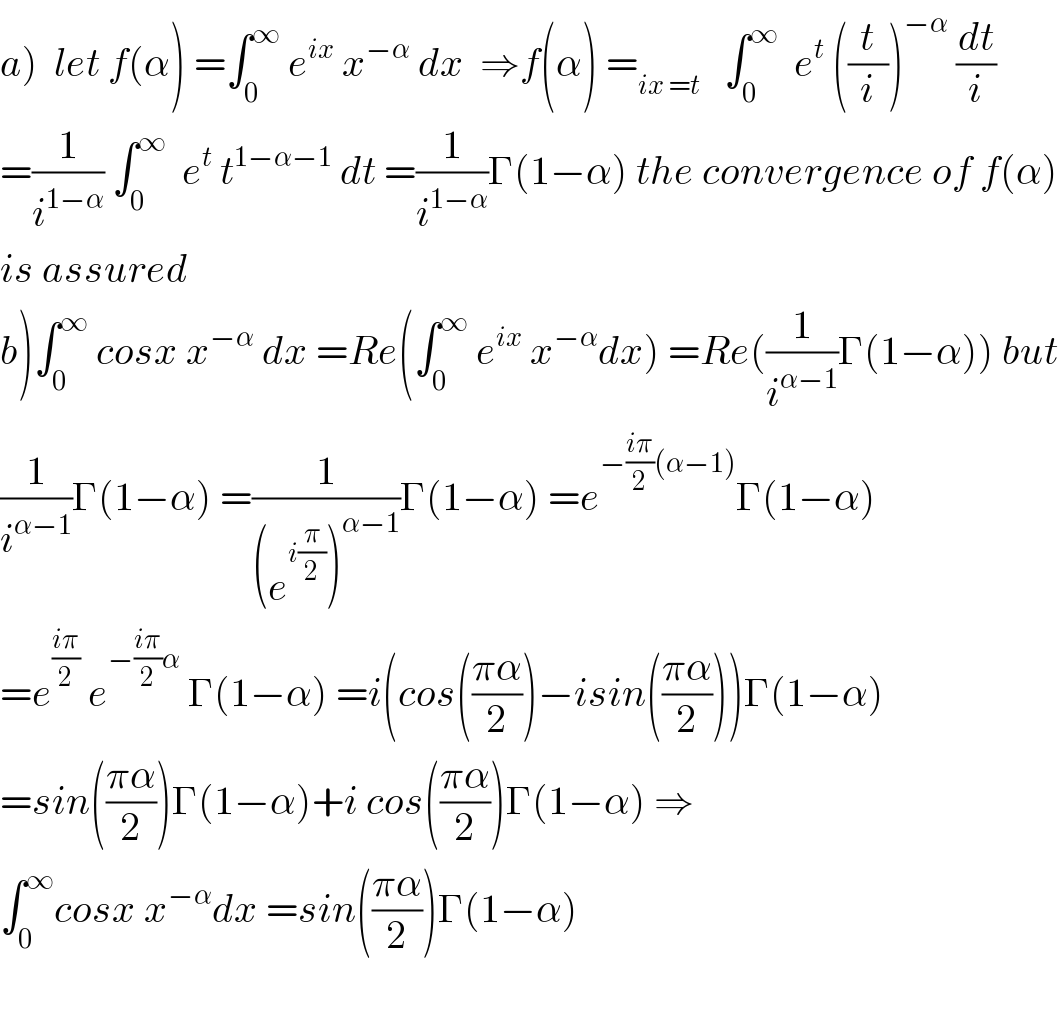
Question Number 65729 by aliesam last updated on 02/Aug/19

Commented by mathmax by abdo last updated on 03/Aug/19

$$\left.{a}\right)\:\:{let}\:{f}\left(\alpha\right)\:=\int_{\mathrm{0}} ^{\infty} \:{e}^{{ix}} \:{x}^{−\alpha} \:{dx}\:\:\Rightarrow{f}\left(\alpha\right)\:=_{{ix}\:={t}} \:\:\:\int_{\mathrm{0}} ^{\infty} \:\:{e}^{{t}} \:\left(\frac{{t}}{{i}}\right)^{−\alpha} \:\frac{{dt}}{{i}} \\ $$$$=\frac{\mathrm{1}}{{i}^{\mathrm{1}−\alpha} }\:\int_{\mathrm{0}} ^{\infty} \:\:{e}^{{t}} \:{t}^{\mathrm{1}−\alpha−\mathrm{1}} \:{dt}\:=\frac{\mathrm{1}}{{i}^{\mathrm{1}−\alpha} }\Gamma\left(\mathrm{1}−\alpha\right)\:{the}\:{convergence}\:{of}\:{f}\left(\alpha\right) \\ $$$${is}\:{assured} \\ $$$$\left.{b}\right)\int_{\mathrm{0}} ^{\infty} \:{cosx}\:{x}^{−\alpha} \:{dx}\:={Re}\left(\int_{\mathrm{0}} ^{\infty} \:{e}^{{ix}} \:{x}^{−\alpha} {dx}\right)\:={Re}\left(\frac{\mathrm{1}}{{i}^{\alpha−\mathrm{1}} }\Gamma\left(\mathrm{1}−\alpha\right)\right)\:{but} \\ $$$$\frac{\mathrm{1}}{{i}^{\alpha−\mathrm{1}} }\Gamma\left(\mathrm{1}−\alpha\right)\:=\frac{\mathrm{1}}{\left({e}^{{i}\frac{\pi}{\mathrm{2}}} \right)^{\alpha−\mathrm{1}} }\Gamma\left(\mathrm{1}−\alpha\right)\:={e}^{−\frac{{i}\pi}{\mathrm{2}}\left(\alpha−\mathrm{1}\right)} \Gamma\left(\mathrm{1}−\alpha\right) \\ $$$$={e}^{\frac{{i}\pi}{\mathrm{2}}} \:{e}^{−\frac{{i}\pi}{\mathrm{2}}\alpha} \:\Gamma\left(\mathrm{1}−\alpha\right)\:={i}\left({cos}\left(\frac{\pi\alpha}{\mathrm{2}}\right)−{isin}\left(\frac{\pi\alpha}{\mathrm{2}}\right)\right)\Gamma\left(\mathrm{1}−\alpha\right) \\ $$$$={sin}\left(\frac{\pi\alpha}{\mathrm{2}}\right)\Gamma\left(\mathrm{1}−\alpha\right)+{i}\:{cos}\left(\frac{\pi\alpha}{\mathrm{2}}\right)\Gamma\left(\mathrm{1}−\alpha\right)\:\Rightarrow \\ $$$$\int_{\mathrm{0}} ^{\infty} {cosx}\:{x}^{−\alpha} {dx}\:={sin}\left(\frac{\pi\alpha}{\mathrm{2}}\right)\Gamma\left(\mathrm{1}−\alpha\right) \\ $$$$ \\ $$
Commented by aliesam last updated on 03/Aug/19

$${thank}\:{you}\:{sir}.{but}\:{the}\:{first}\:{question} \\ $$$$\:{ineed}\:{to}\:{prove}\:{the}\:{integral}\:{is}\:{ineed} \\ $$$${convergent}\:{before}\:{computing}\:{its}\:{value} \\ $$$${concerning}\:.{the}\:{second}\:{question},{i}\:{meant}\:{by}\:{complex}\:{integration} \\ $$$${is}\:{by}\:{using}\:{the}\:{residue}\:{theorem} \\ $$$$ \\ $$
Commented by aliesam last updated on 04/Aug/19

